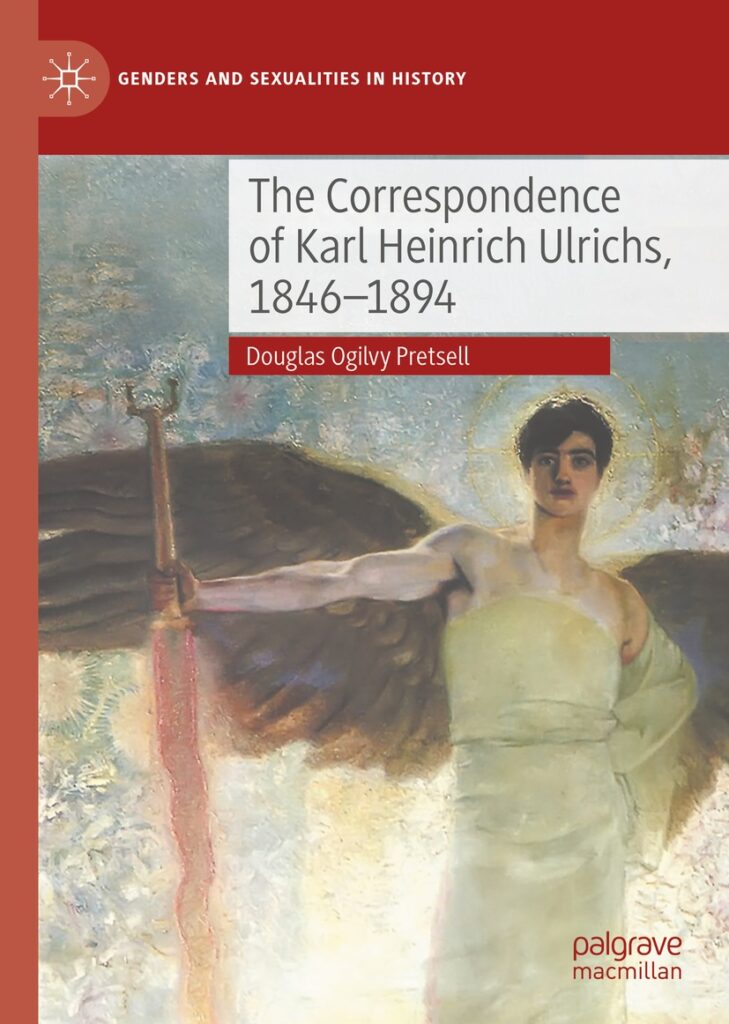Douglas Pretsell
The Correspondence of Karl Heinrich Ulrichs, 1846-1894 is a nearly complete collection of the translated letters Karl Heinrich Ulrichs sent and received. Between 1862 and 1880, the German lawyer Ulrichs was the world’s first gay activist – though he used the word ‘urning’ for men who were attracted to other men. Guided by a critical introduction, the reader can focus on the letters relating to Ulrichs’s employment, the formulation of his ideas, coming out to his family, his first years of activism and letters to and from other urnings, his arrest and imprisonment, and the letters between him and some of the leading characters of his day.
 NOTCHES: What drew you to this topic, and what questions do you still have?
NOTCHES: What drew you to this topic, and what questions do you still have?
Douglas Pretsell: On May 1, 2008, I was living in Munich. It was the day after I first met my husband. I attended a gay festival for the unveiling of a gay maypole in Karl Heinrich Ulrichs Platz. I looked Ulrichs up online. I have been fascinated with him ever since and have been delighted to make his life the focus of my research and writing in recent years. I am still writing about Ulrichs and I suppose the questions I am still engaged with ask: why did this happen in Germany, and why the 1860s?
NOTCHES: This book engages with histories of sex and sexuality, but what other themes does it speak to?
Pretsell: The most obvious themes relate to the position of this history on the cusp of modernity, at a time when Germany was going through substantial structural changes and the parallel flowering of medical science and in particular psychiatry as leading disciplines of the era.
NOTCHES: How did you research the book?
Pretsell: Most of the letters were gathered digitally from archives in Germany, Austria, Switzerland, Italy and Hungary. While some of these had been published in German and others had been described as sources, it was a particular joy to discover some letters that had never before been found. Ulrichs published letters and extracts from letters within his books and, once these were excavated, they provided and extraordinarily rich archive to supplement the physical letters.
NOTCHES: Whose stories or what topics were left out of your book and why? What would you include had you been able to?
Pretsell: Sadly, there was not room for all of the letters. Postcards, single line extracts, and letters to and from literary indexers were not hard to let go of, but there was a large number of letters written between other individuals about Ulrichs that were rich and revealing. Unfortunately, there were too many of them to be included in this volume.
NOTCHES: Did the book shift significantly from the time you first conceptualized it?
Pretsell: I hadn’t collected the letters when this book was first envisaged and necessarily the project changed as each new tranche of letters came in. However, the central concept of an archive of letters with a critical introduction did not change.
NOTCHES: How did you become interested in the history of sexuality?
Pretsell: I have been reading about the history of sexuality since the 1990s but the opportunity to study and research this topic only came when I faced redundancy in 2016. I suppose part of my initial interest was around the time I first came out and was reading as much as I could. At this time I came across both Michel Foucault and John Boswell.
NOTCHES: How do you see your book being most effectively used in the classroom? What would you assign it with?
Pretsell: This is a guided source book, appropriate to anyone teaching early gay history or the origins of the gay/homosexual/urning identity. I was asked recently about what primary sources one might use to teach Foucault’s history of sexuality and the letters from urnings to Ulrichs would be perfect for that.
NOTCHES: Why does this history matter today?
Pretsell: It is about who we are as queer people. Right there, at the very beginning of the modern queer identity, our queer ancestors were seizing the moment. Many of their preoccupations and political desires are the same as we have today and understanding them helps us understand ourselves just that bit better.
NOTCHES: Your book is published, what next?
Pretsell: Right now I am working on my next book where I am using the letters as the basis for a historical analysis of the men who called themselves ‘urnings.’ As a history from ‘down below’ this gives a unique perspective on the legacies of Ulrichs’s work and the development of queer politics in the years before they were formally organised.

Douglas Pretsell is a historian examining the queer identity formation and activism in Germany in the years before the ‘homosexual.’ The research has focussed primarily on the correspondence of the Hanoverian lawyer, Karl Heinrich Ulrichs (1825-1895). Douglas, who is originally from Scotland, lived for many years in Munich and it was there, in 2008, that he first read about and started studying Ulrichs.

NOTCHES: (re)marks on the history of sexuality is licensed under a Creative Commons Attribution-NonCommercial-NoDerivatives 4.0 International License.
Based on a work at www.notchesblog.com.
For permission to publish any NOTCHES post in whole or in part please contact the editors at NotchesBlog@gmail.com




